Word count was a ranking factor back in, oh, 2005. Google representatives keep telling us (here and here and here and here and…) that fine-tuning the number of words on a page is not going to make it rank higher.
But they still avise creating “rich, in-depth content”. Content briefs still provide a minimum number of words for content creators to respect. Yoast still calls you out if your post isn’t long enough. And SEO tools all report on word count.
Why?
Is the SEO community beating a dead horse (again)? Or is word count still a ranking factor in 2020 and beyond?
I suggest we take a look at how machine learning algorithms treat individual metrics in order to find one explanation for what’s going on.
The evidence: strong correlations between word count and rank
Let’s be clear for once and for all: on almost all sites, there is strong, conclusive evidence for a correlation between word count and rank.
In most (but not all) cases, the more words a page has, the better it ranks in Google.
What are ranking factors?
Ranking factors are the parameters of a page that are taken into consideration by Google’s ranking algorithm when deciding whether to rank your page in the results ahead of or behind your competitors.
In the early days, these were fairly easy to point to. Having a keyword in the page’s <title> tag, for example, was definitely a ranking factor. If you did, your page gained invisible points; if you didn’t, you lost invisible points. And when your page had more points than your competitor’s page for the same keyword, yours came out on top for searches for that keyword.
Ranking factors in an era of machine learning and black box SEO
Enter machine learning. Machine learning algorithms examine the pages users like. Based on that examination, they “learn” to correctly predict the indexed pages that users will also like. But behind a machine learning algorithm, there isn’t a list of pre-programmed features that are scored and taken into account.
Before
- Do users like more words?
- Do users like 404s?
- Do users like fast pages?
- …
After
- Will users like this page?
The result is a complex algorithm that is, essentially, a black box: we don’t know which characteristics of a page make a significant difference to the algorithm. In many cases, we can’t even obtain a list of all of the characteristics that are taken into account. Much of the time, we can only observe correlations.

Example of a correlation between a page’s rank on the SERPs and frequency of hits by Googlebot. Source: Oncrawl
Google’s preference for communication around qualitative standards such as “E-A-T” and “rich content” is a good indicator that ranking algorithms are no longer based on a countable number of explicit, well-defined elements.

Source: Google Webmaster Central Blog – What webmasters should know about Google’s core updates
Another consequence of this type of algorithm is that even when we know that something is a ranking factor, it’s nearly impossible to say how much influence that ranking factor has on a given page.
Good examples of known ranking factors with unknown impacts are UX factors like page speed and the new Core Web Vitals metrics coming in 2021. Google confirms that these are definitely ranking factors. But amazing page speed is not necessarily going to put you ahead of relatively slow competitors.
This is because in machine learning algorithms, it’s the combination of different factors that can give a page a boost or a handicap. Each ranking factor has no specific influence on its own, but only in conjunction with all of the other elements of a page.
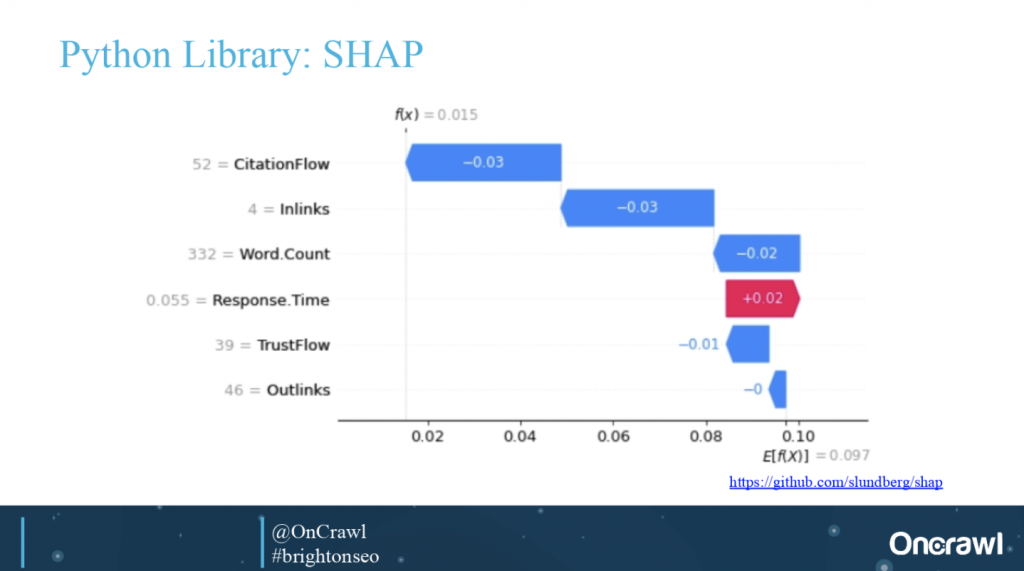
Source: Vincent Terrasi – “Explainable Machine Learning for Ranking Factors” (Brighton SEO 2020)
If this is something you want to explore further, you’re not the only one. The “explainability” of complex algorithms is a subject of research at the moment. Oncrawl’s Vincent Terrasi spoke at Brighton SEO about using some of these methods to determine the ranking factors that most influence individual URLs (Unfortunately–and predictably–, this sort of thing prohibitively computationally expensive at the moment.)
The case for word count
By way of example, let’s look at a pair of imaginary pages by Susie A. Author, a recognized expert in her field. Both pages handle the same complex subject:
- Page A is 200 words long. Let’s say it’s the summary for the general public of an in-depth study Susie carried out.
- Page B is 5000 words long. It contains the full study and conclusions.
It’s not surprising that the 5000-word page might rank higher. It’s more likely to gain more backlinks from relevant experts in the same field. It might look more like high-ranking content that Susie has published before. In short, it ranks better because it’s written by Susie, because it’s a technical subject, and because it’s long-form content.
But that doesn’t mean all long-form content ranks better. Now imagine pages C and D, both presenting the same product for sale:
- Page C is 200 words long but contains a succinct, accurate product description.
- Page D has 1500 words. It’s stuffed with keywords for anything vaguely related to the product.
Here, we’d expect Pace C to rank better because no one reads long product descriptions, keyword stuffing will penalize a page, and so on.
But in both Susie’s study and the product pages, word count plays a role in the final evaluation, not because the page has a specific number of words, but because the number of words is inherently linked to style, subject, author, intent, and content.
How to find the right number of words for your page
If you want to take advantage of word count as a “ranking factor”, you can. But you’ll need to figure out what number of words will boost each type of page on a site of the same size and industry as yours.
The good news is that you can use your own site’s performance to find the word counts that work best for your pages.
You can do this in many ways, but here’s a quick and easy way to do it in Oncrawl.
Split your URLs into groups by type of page
Each type of page has a different purpose and different characteristics. You know best which types of page exist on your site. Ours, for example, has SaaS product pages, ephemeral marketing campaign landing pages, blog posts, blog pagination…
We definitely don’t want to apply the same standards to blog posts as to SaaS feature pages, so we’ll make sure these pages go into separate groups.
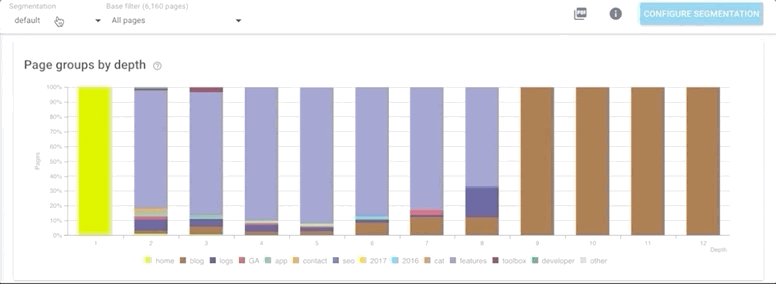
Switching segmentations in Oncrawl
You can use segments in Oncrawl to do this based on any criteria you want to use, from manual lists to URL structure to number of organic visits…
Find out what wordcount ranks best
For each group, examine the word count distribution compared to page rank. Here we’re looking at ranking data for average page rank for a specific country, as reported in Google Search Console.
You might see a high correlation between word count on a given page type and rank. If this is the case, find the word count range that corresponds with the best rank.
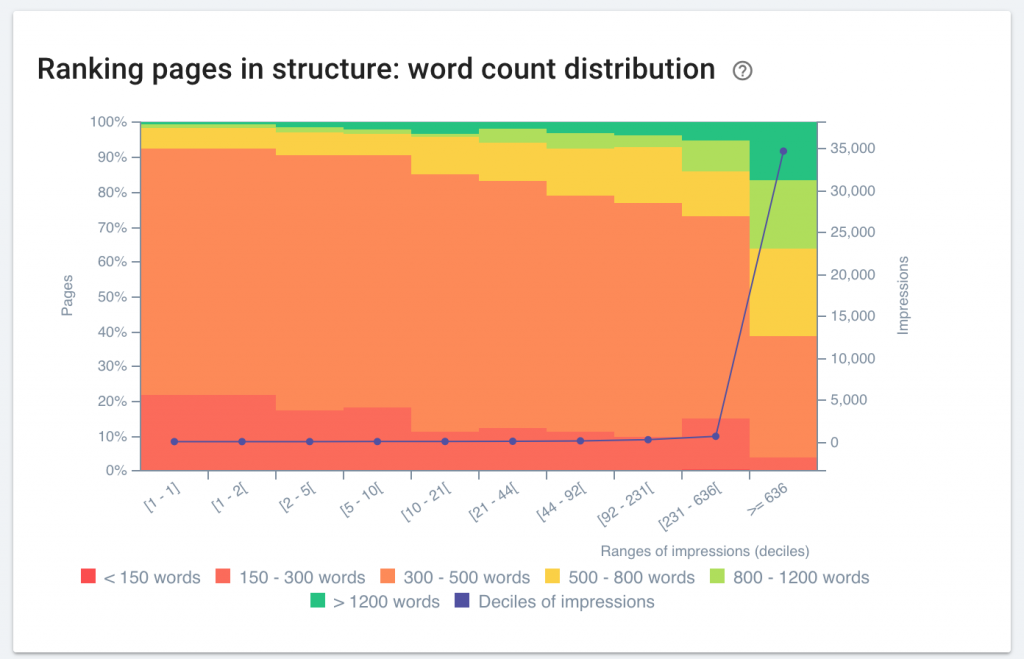
Example of longer pages performing better. Source: Oncrawl
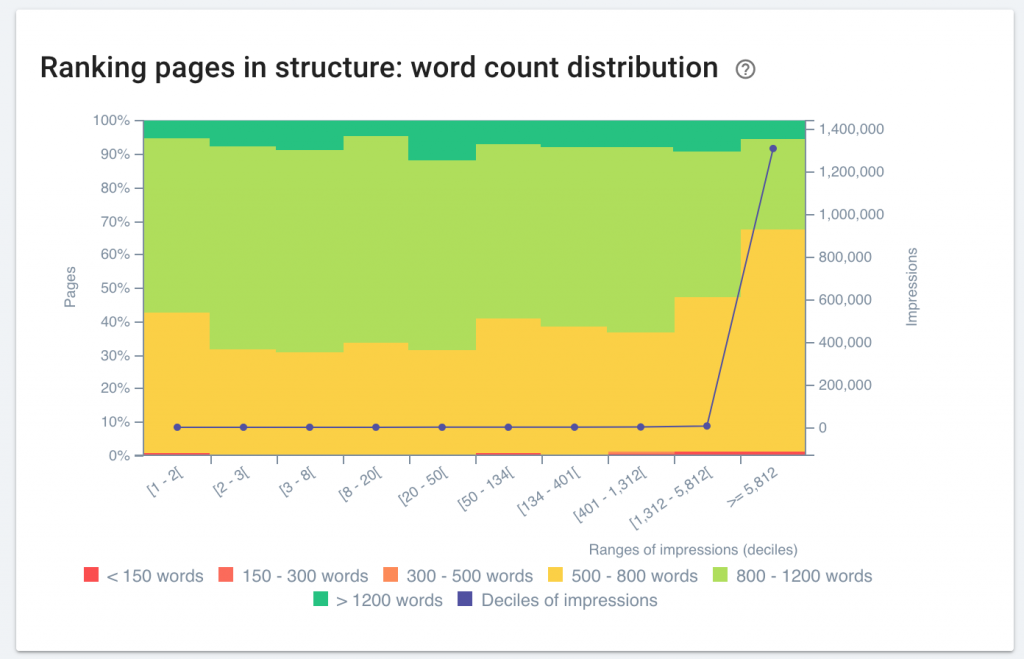
Example of shorter pages performing better. Source: Oncrawl
On the other hand, you might not see a high correlation between word count and rank. If there’s no correlation, there’s no sense in trying to maintain an arbitrary word count limit in order to rank your page.
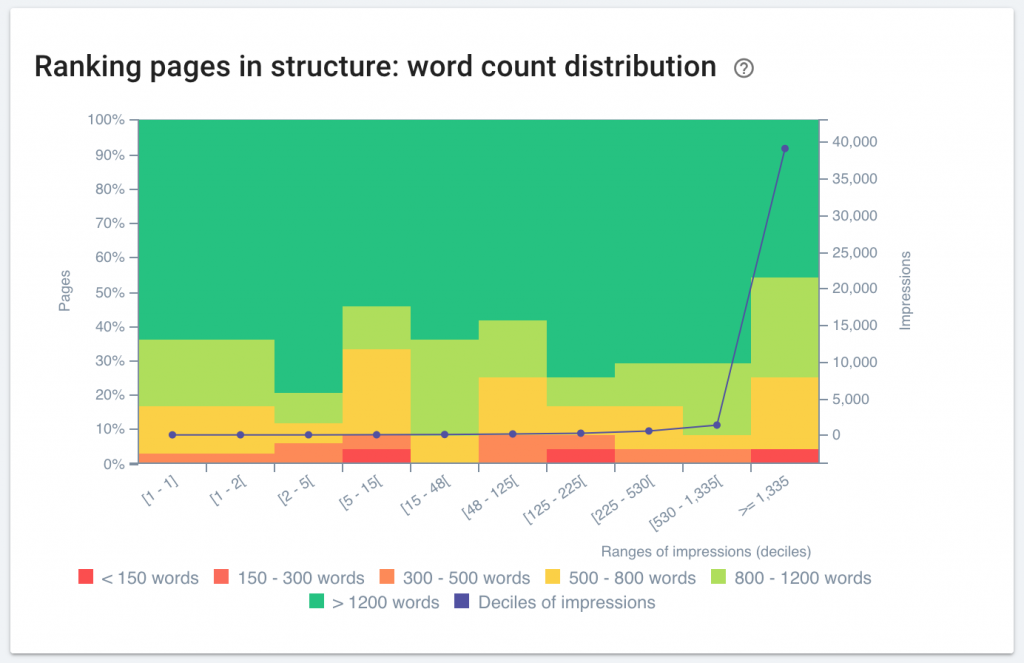
Example of weak correlation between word count and on-SERP visibility. Source: Oncrawl
However, word count might still influence how users interact with your site–such as how long they stay on the site, how many pages they visit–and whether or not they convert. If word count has no influence on your pages for ranking purposes, check the correlation between word count and user behavior before throwing your rules for copy length out the window!
Export a list of pages with less-than-ideal word counts
Get your lists of pages to update. In Oncrawl, you can click on a section of a graph to see a list of pages in the page group you’re looking at that don’t fall into the range you found to be optimal.
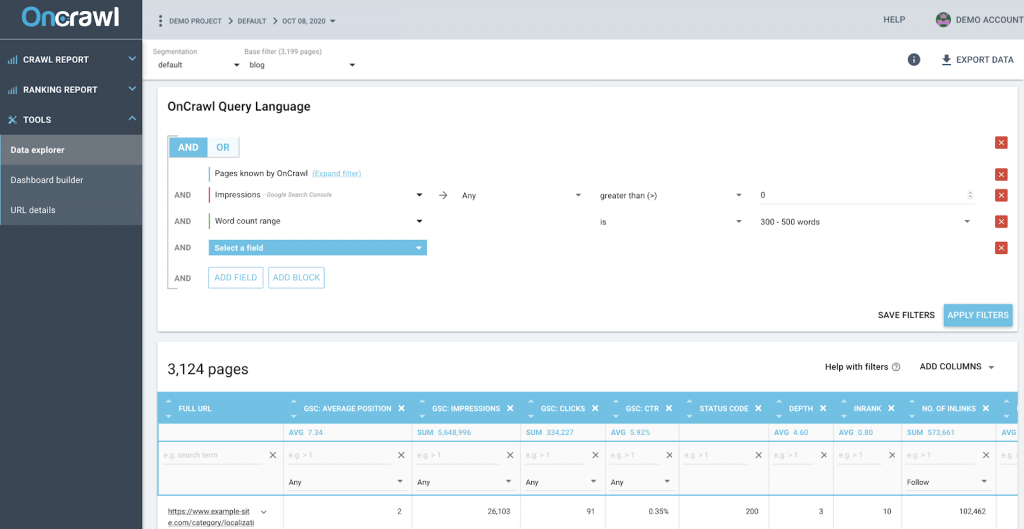
Using the Data Explorer to get a list of pages whose word count should be improved. Source: Oncrawl
Add any additional information you’d like to have by adding columns in the Data Explorer, then export the report.
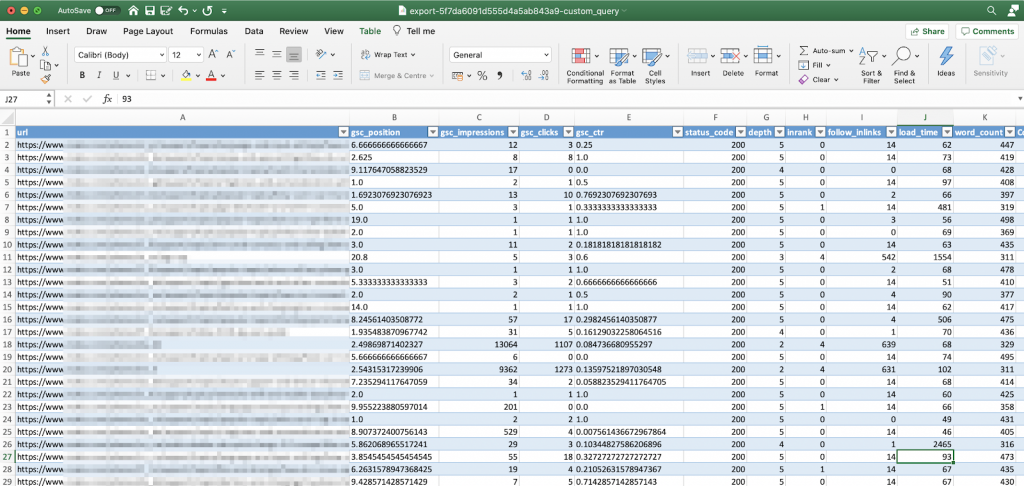
Takeaways: word count in 2020 and onwards
Word count is not hard-coded into Google ranking algorithms. When Google representatives say there’s no “word count” ranking factor, they’re not joking: there’s no magic number of words that will guarantee you a boost in rankings.
BUT. Within the right context, word count is an extremely reliable indicator of other rankable factors on a page. Because word count co-varies with many other elements, the “wrong” word count indicates problems with other ranking factors for a certain type of page on a certain type of website ranking for a certain type of search term. In short: even today, word count is one of many factors that can strongly influence rankings.
So don’t get rid of your tools that check the word count on your posts and pages! Of course you shouldn’t blindly follow recommendations for “500-800 words” or “long-form content”. However, you should absolutely adapt your copywriting templates and styles to be as brief — or as in-depth — as other pages of the same type on your site (or your competitors’ sites!) that rank well for your target queries.

